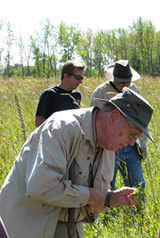Fermilab prairie helps engineers protect wetlands
 |
| Environmental experts examine Fermilab's prairie to learn about rare plants. |
Robert Mohlenbrock glanced to his right and spied a thin green stalk amidst a sea of grasses and flowers.
“Oooohhh. Look at this guy,” he said to the nearly two dozen federal environmental engineers eagerly jotting down his every word. “There’s a stem without a leaf on it. That has got to be Eleocharis. This used to be the hardest thing to identify; now it’s the easiest.”
As knowledge about native wetland plants and grasses expands and suburban sprawl shrinks their numbers, having an eye for what needs conserving has become a much sought-after skill.
Mohlenbrock, a Southern Illinois University Carbondale professor emeritus and renowned author, uses Fermilab as his training ground because of its unique floral diversity. The site boasts 1,100 acres of restored tallgrass prairie, of which less than one-tenth of 1 percent remains in Illinois.
“A site like this is going to have a higher quality,” said Keith Wozniak, chief of the west division of the Chicago District Army Corps of Engineers.
The Corps, along with DuPage County, send wetland regulators to places like Fermilab twice a year to learn how to spot the rarest flora on sites eyed for development. This training increases the likelihood of spotting even a few rare plants so that officials can work with developers to build around the wetlands or, at a minimum, ensure adequate replacement of the wetland through the Illinois wetland banking system. Developers purchase credits to replace wetland damage by creating, restoring, enhancing or preserving wetlands in other locations. In 1991, the federal government adopted the Illinois model as a national standard.
Anything larger than one-tenth an acre requires remediation. Just how much, depends on the quality of the wetland, a designation reached through a formula weighing the amount, variety and rarity of wetland flora.
Fermilab’s large number of wetland species, including several rare varieties, gives environmental engineers a chance to learn about flora they might otherwise overlook. When asked why the U.S. Army Corps of Engineers chooses Fermilab as a classroom, several members immediately remarked on the high quality and diversity of the plantlife. Many of the other training sites the engineers see have less than half a dozen species of wetland plants and grasses, Wozniak said.
The high-quality prairie and wetland species thrive through a program of invasive plant removal, restoration efforts and Fermilab’s commitment to stewardship.
Fermilab hosts a searchable plant database and actively recruits volunteers for restoration activities.
-- Tona Kunz
|